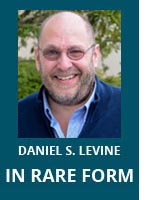 Bo Bigelow is on a quest to find 68 patients.
Bo Bigelow is on a quest to find 68 patients.
Bigelow, chairman of the Foundation for USP7-Related Diseases, needs to find 68 more patients who, like his daughter Tess, have a mutation to the USP7 gene to get researchers to begin a phenotypic study of the condition.
The study is an important first step in the research process that he hopes will eventually lead to the development of a cure.
Bigelow’s quest is a reminder of the many obstacles rare disease patients and their families face in moving beyond a diagnosis to finding treatments and cures. Before engaging drug companies, raising money to fund research, and finding researchers to engage, finding other patients for an ultra-rare disorder can be the first stumbling block.
When Bigelow and his wife received Tess’ diagnosis, the paperwork from the gene testing company simply described the USP7 gene mutation as a “variant of unknown significance.” As far as Bigelow and his wife knew, Tess was the only person to have the mutation.
“My wife and I are type A people,” said Bigelow, an attorney who stepped back from full-time practice to care for his daughter and work for the foundation. “We tried to let it go and say, ‘this is where the journey ends.’”
But a few months later when Bigelow read a New Yorker profile of Matt Might, whose son was the first patient to be diagnosed with a genetic mutation to the NGLY1 gene, he learned about Might’s approach to finding other patients with the condition. Knowing other parents who got the same diagnosis would search Google, Might put a beacon on the Internet so they would find him when they searched for information.
In August 2015, Bigelow followed suit and less than an hour after posting his first blog entry heard from a researcher in the lab of Christian Schaaf at the Baylor College of Medicine. The researcher told Bigelow they were studying the gene. Rather than being the only patient in the world with the mutation, Tess was one of eight.
Little is known about USP7-related disorders. It is associated with neurodevelopmental problems. Last year USP7 families gathered for the first family conference at Baylor. At the time, 21 patients had been identified, but only seven families were able to attend.
Previously, Schaaf had held off telling the families to raise money for research or starting a foundation. At the meeting he explained that the reason he had done so was because even though the children all shared the UPS7 mutation and had similar appearances, he couldn’t prove the mutation was the cause of the disease. Now that he had the opportunity to review and compare MRIs from the children, he was convinced that they each had the same disease.
In developing a research agenda, Schaaf said the first thing they should do is conduct a phenotypic study to determine the way the disease manifests itself. To do that, he said, would require $180,000 and 100 patients with the mutations.
Bigelow and the other families have been raising money. They are about $100,000 towards their goal. But it is finding patients where Bigelow is redoubling his efforts with other members of the foundation under what they are calling Project Artemis. Artemis is the Greek goddess of the hunt.
The count is now up to 32, four times what it was when Tess was diagnosed.
Bigelow does what he can to send up additional beacons. Already he does a regular podcast about Tess, and he’s done interviews with major media outlets including The Washington Post and National Public Radio. He also made a short documentary about Tess, which he eventually screened at Disorder: The Rare Disease Film Festival, which he co-founded with Daniel DeFabio.
As part of Project Artemis, his latest push is to get genetic testing companies to refer to his foundation patients who receive future diagnoses of USP7 mutations, rather than simply telling them it is a variant of unknown significance.
Baylor’s Schaaf has already published a study on the first seven USP7 patients. A new study, expected to be published soon on a second cohort of USP7 patients, could help in getting genetic testing companies to refer patients.
“The paper is going to be one of the major keys,” said Bigelow. “If we can get on their panel, it’s going to make a major difference.”
Project Artemis is a fitting name for the effort. Artemis is not only the goddess of the hunt, but also protector of children and the vulnerable. In this case, the two roles are one and the same.
June 6, 2018
Photo: Bo Bigelow and Tess

Stay Connected
Sign up for updates straight to your inbox.
